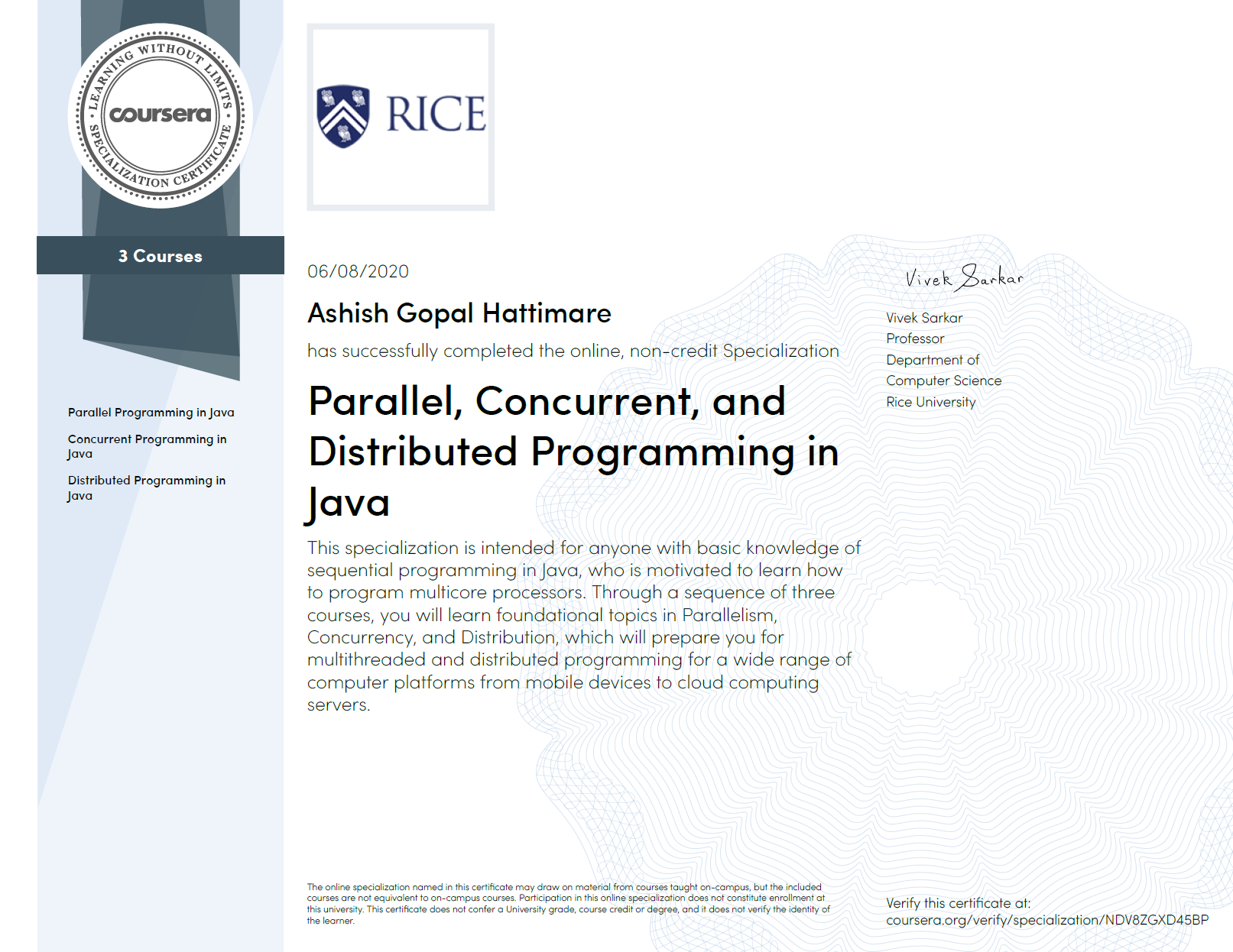Parallel Concurrent and Distributed Programming in Java | Coursera Certification
LEGENDS LABELLING
✔️ - The topics covered during the course
✅ - Self-done assignment
☑ - Instructor assistence required
Week 1 : Task Parallelism
✔️ Demonstrate task parallelism using Asynkc/Finish constructs
✔️ Create task-parallel programs using Java's Fork/Join Framework
✔️ Interpret Computation Graph abstraction for task-parallel programs
✔️ Evaluate the Multiprocessor Scheduling problem using Computation Graphs
✔️ Assess sequetional bottlenecks using Amdahl's Law
✅ Mini project 1 : Reciproncal-Array-Sum using the Java Fork/Join Framework
Week 2 : Functional Parallelism
✔️ Demonstrate functional parallelism using the Future construct
✔️ Create functional-parallel programs using Java's Fork/Join Framework
✔️ Apply the princple of memoization to optimize functional parallelism
✔️ Create functional-parallel programs using Java Streams
✔️ Explain the concepts of data races and functional/structural determinism
✅ Mini project 2 : Analysing Student Statistics Using Java Parallel Streams
Week 3 : Loop Parallelism
✔️ Create programs with loop-level parallelism using the Forall and Java Stream constructs
✔️ Evaluate loop-level parallelism in a matrix-multiplication example
✔️ Examine the barrier construct for parallel loops
✔️ Evaluate parallel loops with barriers in an iterative-averaging example
✔️ Apply the concept of iteration grouping/chunking to improve the performance of parallel loops
✅ Mini project 3 : Parallelizing Matrix-Matrix Multiply Using Loop Parallelism
Week 4 : Data flow Synchronization and Pipelining
✔️ Create split-phase barriers using Java's Phaser construct
✔️ Create point-to-point synchronization patterns using Java's Phaser construct
✔️ Evaluate parallel loops with point-to-point synchronization in an iterative-averaging example
✔️ Analyze pipeline parallelism using the principles of point-to-point synchronization
✔️ Interpret data flow parallelism using the data-driven-task construct
☑ Mini project 4 : Using Phasers to Optimize Data-Parallel Applications
Week 1 : Threads and Locks
✔️ Understand the role of Java threads in building concurrent programs
✔️ Create concurrent programs using Java threads and the synchronized statement (structured locks)
✔️ Create concurrent programs using Java threads and lock primitives in the java.util.concurrent library (unstructured locks)
✔️ Analyze programs with threads and locks to identify liveness and related concurrency bugs
✔️ Evaluate different approaches to solving the classical Dining Philosophers Problem
✅ Mini project 1 : Locking and Synchronization
Week 2 : Critical Sections and Isolation
✔️ Create concurrent programs with critical sections to coordinate accesses to shared resources
✔️ Create concurrent programs with object-based isolation to coordinate accesses to shared resources with more overlap than critical sections
✔️ Evaluate different approaches to implementing the Concurrent Spanning Tree algorithm
✔️ Create concurrent programs using Java's atomic variables
✔️ Evaluate the impact of read vs. write operations on concurrent accesses to shared resources
✅ Mini project 2 : Global and Object-Based Isolation
Week 3 : Actors
✔️ Understand the Actor model for building concurrent programs
✔️ Create simple concurrent programs using the Actor model
✔️ Analyze an Actor-based implementation of the Sieve of Eratosthenes program
✔️ Create Actor-based implementations of the Producer-Consumer pattern
✔️ Create Actor-based implementations of concurrent accesses on a bounded resource
✅ Mini project 3 : Sieve of Eratosthenes Using Actor Parallelism
Week 4 : Concurrent Data Structures
✔️ Understand the principle of optimistic concurrency in concurrent algorithms
✔️ Understand implementation of concurrent queues based on optimistic concurrency
✔️ Understand linearizability as a correctness condition for concurrent data structures
✔️ Create concurrent Java programs that use the java.util.concurrent.ConcurrentHashMap library
✔️ Analyze a concurrent algorithm for computing a Minimum Spanning Tree of an undirected graph
☑ Mini project 4 : Parallelization of Boruvka's Minimum Spanning Tree Algorithm
Week 1 : Distributed Map Reduce
✔️ Explain the MapReduce paradigm for analyzing data represented as key-value pairs
✔️ Apply the MapReduce paradigm to programs written using the Apache Hadoop framework
✔️ Create Map Reduce programs using the Apache Spark framework
✔️ Acknowledge the TF-IDF statistic used in data mining, and how it can be computed using the MapReduce paradigm
✔️ Create an implementation of the PageRank algorithm using the Apache Spark framework
☑ Mini project 1 : Page Rank with Spark
Week 2 : Client-Server Programming
✔️ Generate distributed client-server applications using sockets
✔️ Demonstrate different approaches to serialization and deserialization of data structures for distributed programming
✔️ Recall the use of remote method invocations as a higher-level primitive for distributed programming (compared to sockets)
✔️ Evaluate the use of multicast sockets as a generalization of sockets
✔️ Employ distributed publish-subscribe applications using the Apache Kafka framework
✅ Mini project 2 : Filer Server
Week 3 : Message Passing
✔️ Create distributed applications using the Single Program Multiple Data (SPMD) model
✔️ Create message-passing programs using point-to-point communication primitives in MPI
✔️ Identify message ordering and deadlock properties of MPI programs
✔️ Evaluate the advantages of non-blocking communication relative to standard blocking communication primitives
✔️ Explain collective communication as a generalization of point-to-point communication
☑ Mini project 3 : Matrix Multiply in MPI
Week 4 : Combining Distribution and Multuthreading
✔️ Distinguish processes and threads as basic building blocks of parallel, concurrent, and distributed Java programs
✔️ Create multithreaded servers in Java using threads and processes
✔️ Demonstrate how multithreading can be combined with message-passing programming models like MPI
✔️ Analyze how the actor model can be used for distributed programming
✔️ Assess how the reactive programming model can be used for distrubted programming
✅ Mini project 4 : Multi-Threaded File Server
